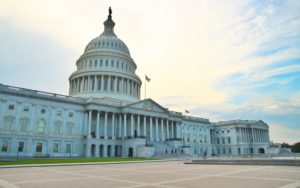
The Trump Administration’s regulations take aim at the ACA’s contraceptive mandate.
The Trump Administration’s final regulations broadening the scope of religious and moral exemptions to the Affordable Care Act’s (ACA) contraceptive mandate could significantly affect access to birth control.
After President Barack Obama signed the ACA, the law required insurance companies to cover certain preventive services, such as birth control and contraceptives, with no charge to patients.
Religious organizations, however, objected to the contraceptive mandate, arguing that it infringed upon their religious beliefs. In response, the federal government allowed houses of worship and religiously affiliated nonprofit organizations to request exemptions from the mandate. In 2014, the U.S. Supreme Court in Burwell v. Hobby Lobby further expanded the list of organizations that qualified for exemptions when it held that for-profit, private companies with a limited number of shareholders could also opt out of the ACA’s contraceptive mandate.
The Trump Administration regulations expand religious exemptions again, making them available for “all types of non-governmental employers, including for-profit corporations,” regardless of size or the number of shareholders. Such employers may now cite moral objections—any personal beliefs “that oppose contraception” so long as they are sincerely held—in addition to religious objections.
Earlier this year, the Supreme Court affirmed these regulations in Little Sisters of the Poor Saints Peter and Paul Home v. Pennsylvania and held that the Trump Administration properly exercised its authority to create a religious and moral exception for certain employers. Most private employers can now opt out of the contraceptive mandate due to religious or moral objections without penalty.
The decision will likely continue to face challenges in state courts and the regulations’ long-term effects remain uncertain.
This week’s Saturday Seminar highlights the potential effects of the Trump Administration’s final contraceptive mandate regulations.
- The Regulatory Review recently featured an essay explaining the Little Sisters of the Poor decision. The Supreme Court struck down challenges by New Jersey and Pennsylvania, finding that the federal agencies had statutory authority to issue the contraceptive mandate exemption regulations. In addition, the Court’s majority rejected a procedural challenge, determining that the agencies followed the Administrative Procedure Act when issuing the regulations. Justice Elena Kagan, in a concurring opinion, indicated that the Court may respond differently to future challenges with different legal bases. In her dissent, Justice Ruth Bader Ginsburg noted that the Court’s decision could leave nearly 126,000 employees without access to no-cost contraceptive services.
- According to Kaiser Family Foundation’s Laurie Sobel and Alina Salganicoff, and Health Management Associates’ Caroline Rosenzweig in a Kaiser Family Foundation issue brief, the ACA slashed out-of-pocket costs for contraception, which allowed women to choose more effective, long-term contraceptive methods. This policy, in turn, reduced “the rate of unintended pregnancy and associated costs of childbirth.” Under the Trump Administration’s new regulations, however, more employers can determine whether to allow no-cost access to the “full range” of contraceptive methods, potentially limiting women’s choices to cheaper but less effective methods.
- The Trump Administration’s final regulations fail to consider fully the risks women face when losing access to contraceptives, Maya Behn and Lydia E. Pace of Brigham and Women’s Hospital and Leighton Ku of George Washington University Milken Institute School of Public Health claim in an article in Women’s Health Issues. Since unintended pregnancies disproportionately affect low income women and women of color, reduced access to contraceptives could be especially burdensome for these communities. All women should be able to make “personal and private health care decisions about contraception” themselves, rather than having their employers decide their reproductive health, Behn, Pace, and Ku argue.
- In a recent article published by the Center for Public Integrity, Anna North of Vox argues that the Trump Administration is waging a war on birth control. In addition to final regulations targeting the ACA’s contraceptive mandate, the Administration has systematically dismantled other federal programs, such as Title X, which provides essential family planning and reproductive counseling services for low income communities. The Trump Administration’s actions have “turned back the clock on years of successful public health policy and jeopardized countless Americans’ ability to control their reproductive lives,” North claims.
- How might the moral and religious contraceptive mandate exemptions affect women who are at risk for the Zika virus, which can cause birth defects? In a recent article in Health Matrix, Linda C. Fentiman of Elisabeth Haub School of Law at Pace University argues that the rules will leave women in U.S. jurisdictions such as Texas, Florida, and Puerto Rico—who face a higher risk for contracting the Zika virus—less able to prevent pregnancies. Fentiman points out that many of the low- and middle-income women whom the rules affect most are also the most at risk for contracting Instead, regulations that increase access to contraception could protect American children from the harmful health effects of exposure to Zika in utero, she argues.
- The United States increasingly stands apart from international standards in two areas of reproductive rights, attorney Aram A. Schvey, formerly of the Center for Reproductive Rights, and Claire Kim of Covington and Burling LLP argue in a Contraception and Reproductive Medicine article. The United States grants religious and moral exemptions to a broad group of institutions compared with other democratic countries that only provide these exemptions to individuals. In addition, U.S. law emphasizes the religious rights of groups seeking exemptions rather than the health concerns of affected individuals. The U.S. federal government and court system “should look to the laws and practices of other democracies” as a blueprint for protecting access to contraceptives, Schvey and Kim explain.
The Saturday Seminar is a weekly feature that aims to put into written form the kind of content that would be conveyed in a live seminar involving regulatory experts. Each week, The Regulatory Review publishes a brief overview of a selected regulatory topic and then distills recent research and scholarly writing on that topic.



